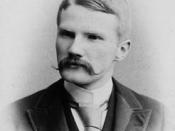The only unequivocal statement regarding the Renaissance is that it brought about change, but beyond that point nothing else is certain. There are two diametrically opposed viewpoints: the Renaissance or that of the notion of PreRenaissance. The former being supported and undisputed until the 1920s, by that of Jacob Burckhardt; while the PreRenaissance initiative is Lynn Thorndike's rather modern notion. It is generally agreed upon that the Renaissance came about due to urbanization, departure from traditional monarchy and the formation of city-states, creating a sense of individualism. Even so, the contrast between the Renaissance and Medieval thoughts isn't as simplistic as it appears. Moreover, when looking at contrasts between periods they are gray at best. Calling the Renaissance "light" and the Middle or Medieval ages "dark" is like calling WWII advanced and WWI unsophisticated or Hinduism primitive and Buddhism modern; but rather, the latter is strongly based or rooted in the preliminary.
The lack of strong differences between the two periods can best be described by the thoughts and works of the early 20th century theorists Haskins, Gilson, and Thorndike.
Burckhardt places great emphasis on cultural achievement when describing the Renaissance, but throughout the Middle Ages, much of the same feats were uncovered. The American medievalist Charles Homer Haskins points out these 12th century accomplishments in his work, "The Renaissance of the Twelfth Century." During the period in question, there was a huge influx of wealth, Florence being the leader in this category. Florence was wealthy enough to create a financially stable middle class and even bourgeoisie which it was thought to earlier lacked; yet, on the contrary such was shown. Haskins notes that the twelfth century witnessed, "an upsurge in economic development and trade," resembling much of the renaissance economic developments. Though education appears largely focused on...


